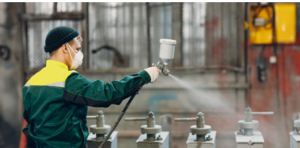Painting contractors provide industrial equipment and facilities with affordable paint coverage at an economical cost. They may assist in adhering to OSHA-recommended colour coding practices to increase visibility and energy efficiency.
Finding an industrial painting experts Auckland with experience working on businesses similar to yours is essential when selecting an expert for industrial painting services. When searching, take note of these important criteria when making a selection:
Durability
Industrial structures and equipment are vulnerable to the elements, including water, heat, dirt and corrosion. With proper application by an experienced industrial painting contractor, paints provide a layer of defence against damage and corrosion to protect surfaces against future deterioration and save on maintenance costs in the long run.
Industrial painting specialists recognise a fresh coat of paint’s many benefits, such as improving its appearance while helping reduce energy costs by reflecting light more effectively and mitigating UV rays’ effects on electrical bills. Furthermore, they understand the unique abrasion resistance needs of each surface in your industrial environment and are equipped to choose an appropriate coating system.
Industrial painting experts Auckland should work around your plant’s production schedule without disrupting business. They provide high-quality results at a price within your budget, using industrial rope access or advanced drone technology, which offers detailed imagery and video reports for complete project evaluation and recommendations.
 Industrial painters specialise in working in environments with equipment used around the clock. Their experts are adept at sandblasting metal surfaces to remove rust and prepare them for high-quality protective paint, so your operations can continue without interruptions.
Industrial painters specialise in working in environments with equipment used around the clock. Their experts are adept at sandblasting metal surfaces to remove rust and prepare them for high-quality protective paint, so your operations can continue without interruptions.
Visibility
Visibility is crucial in an efficient workplace, so hiring professional industrial painting services is crucial. Industrial painters are trained to manage different surface preparation techniques such as abrasive blast media and air pressure washing before applying various finishes like glossy, semi-gloss and matte; glossy is especially popular as it reflects light easily, while matt finishes are less often necessary but may be required in certain instances.
Energy Efficiency
Industrial painting contractors face greater stakes in quality painting services; their success often depends on whether their work looks appealing and is well protected from weather elements. Factory and warehouse environments, where production goals must be achieved, present unique challenges.
Coatings can make your manufacturing environment run more efficiently by protecting equipment from corrosion, increasing lifespan, and decreasing energy costs by reflecting sunlight into space.
ASRC Industrial experts have the experience and know-how to complete your industrial painting project on time and within budget while taking safety seriously so you can rest easy knowing your workers will remain protected in the field.
Safety
Industrial painting teams operate in various environments and may be called on to complete projects for steel plants, warehouses, factories and other manufacturing spaces. Paint used here typically must be free from impurities as it must withstand the heavy use of machinery and equipment at these facilities.
An industrial painter’s primary goal should be durability over aesthetics. They understand the specialised equipment necessary for such projects and which coating options should be utilised to safeguard structures from harm. Furthermore, they will assess existing surfaces to identify any required repairs before painting new coats of paint on them.
An industrial painter must know all the different paint and coating options available to meet clients’ specific requirements best and assess safety concerns for each.
Quality
Industrial painting projects must meet a high level of consistency and quality that meets the client’s demands. It requires adherence to clear quality control processes that are applied consistently. It includes a thorough surface preparation that may include sandblasting, washing, chemical etching, mechanical etching, or other specialised prep procedures.
In addition, they must meet certain environmental requirements. They can also require working in complex industrial environments containing hazardous chemicals, dust, or fumes. Industrial painting companies are used to these challenges and can help businesses avoid costly delays and work around them. They can also advise on colour selection and recommend products that will reduce maintenance costs and extend the life of surfaces, structures, and machinery. It helps to prevent rust, corrosion, and other damage.